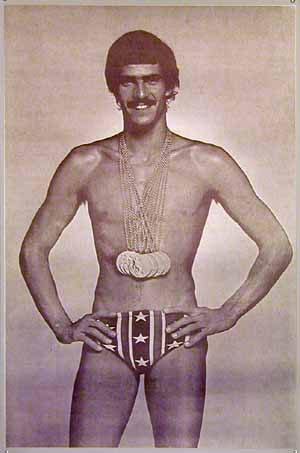skip to main |
skip to sidebar
There has been a lot of buzz this summer about Michael Phelps winning eight gold medals at the Beijing Olympics, beating Mark Spitz's record of seven in one Olympic games set in Munich in 1972. I don't think I'd heard of Mark Spitz before this summer, but I've heard his name about 300 times in the last four days. And it is always in the same sentence as "Michael Phelps." All of a sudden I got the urge to see what this guy looked like.I couldn't believe what I found: Okay, he's kind of hot here:
Okay, he's kind of hot here: But, seriously, what's with the porn stash?
But, seriously, what's with the porn stash? Mark Spitz won each of his 1972 Olympic races handily without wearing a swim cap or shaving his pits. Quite a difference from this summer's races which are won by hundredths of seconds and too-long nose hairs probably make a noticeable difference let alone facial hair.NY Times has an interesting article in which Spitz and Phelps are compared. Phelps would have beaten Spitz by half a lap in each event, but who knows what the difference in pools, swimwear, and a razor would make in the comparing of the two
Mark Spitz won each of his 1972 Olympic races handily without wearing a swim cap or shaving his pits. Quite a difference from this summer's races which are won by hundredths of seconds and too-long nose hairs probably make a noticeable difference let alone facial hair.NY Times has an interesting article in which Spitz and Phelps are compared. Phelps would have beaten Spitz by half a lap in each event, but who knows what the difference in pools, swimwear, and a razor would make in the comparing of the two.
I've jumped on the Michael Phelps bandwagon this summer. This guy is phenomenal. After watching him win the 400m IM by a body length, and shatter his own world record by almost a second and a half, it's hard not to be amazed.Last night I watched the 4x100m Freestyle Relay final and completely freaked out - and freaking out is not something I normally do. You may have heard announcers bring up the race again and again since the event as "the best relay race ever seen," and it was as impressive as they described.Michael Phelps began the race behind Australian's Eamon Sullivan, who broke the world record for fastest split at 47.24 seconds (apparently only the lead swimmer in a relay can make an official record because they begin in the standard standing position), Garrett Weber-Gale gained some ground for the US, but then Cullen Jones lost the U.S. lead behind Frenchman Frederick Bousquet - who swam the fastest split until that time at 46.63s. American anchor Jason Lezak was a full half second behind the favored French anchor, Alain Bernard. He was still behind at the last 50m, but miraculously pulled ahead in the last meter to win by .08 seconds, and swim the fastest split ever at 46.06s.The U.S. final time was 3.08.24, beating the previous world record set by the U.S. in the preliminary race, by 3.99s.Whew. That may be more information than you cared to know about the race, but my reason for including the play by play was to point out how many records were broken in one race.Watching athletes break records in what seems like every event, I began to wonder when this would level off. Are all of these world records just going to be broken in 2012? How much of this success is due to technology, like the new Speedo LZR suit, and allowing professional athletes to compete?The New York Times does a good job of looking at every angle that could affect so many record-breaking swims this summer. Whether it's technology or talent, these races are exciting to watch.




